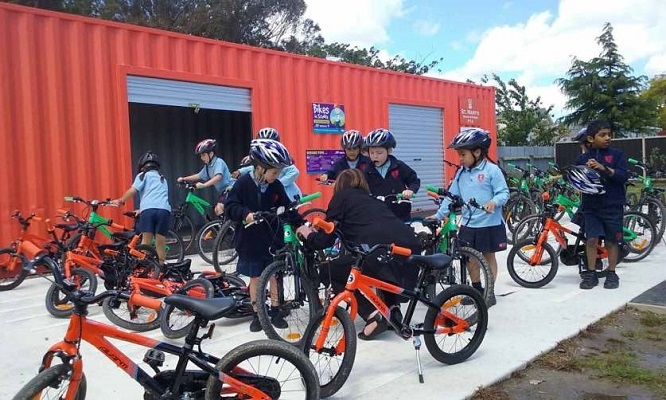
For Kiwi kids, learning to ride a bike used to be a rite of passage. Getting your first bike signalled freedom and excitement. Kids with bikes could travel independently to meet friends much more quickly than on foot, and enjoy the special kind of fun that is biking with friends.
But during the past 25 years, there has been a dramatic fall in biking by primary school children in New Zealand. A 2015 Ministry of Transport survey revealed that between 1990 and 2014, the average amount of time that primary age children spent biking had fallen from 28 minutes a week to just four minutes. Many children today do not ever experience the joy of biking or the social and health benefits attached.
Bikes in Schools is a programme set up to reverse this trend. It’s run by Bike on New Zealand Charitable Trust as a way to help children learn to bike and start riding on a regular basis.Since the programme kicked off in 2010, primary schools around the country have been lining up to access support and advice from the charity in order to build a track and bicycle storage, buy good quality bikes and helmets, and access a cycling skills programme.
Bikes in Schools co-founder Paul McArdle says that schools that have implemented the programme are reporting significant benefits to students. “Fitness, health, confidence, self-esteem have been huge benefits and then, as children have become good at cycling they suddenly seem to become good at swimming or their school work.”
Health benefits
Independent research by the Eastern Institute of Technology tracked the impact of Bikes in Schools at three schools for two years. Teachers reported many physical benefits including; increased physical fitness, motor skills and coordination, and this was supported by the data collected, which showed an increase in estimated VO2max (a measure of aerobic fitness).
Data collected for each of the schools demonstrated that the percentage of obese children dropped from 2011 to 2012. This went against the national trend, which was an increase of two per cent.
“This is the best opportunity I’ve seen for decades,” says Judy Turner, from the Bay of Plenty District Health Board. “By bringing bikes into schools and storing them at school, it means that kids who don’t get a chance to ride to school or who don’t have a bike at home, now have access to a bike, a track to ride it on, some supervision and lessons. It’s just gold.”
James St School in Whakatane implemented Bikes in Schools in 2013. “We thought anything that would be beneficial for our children and would give them another range of skills and another option of activity would be well worthwhile so our Board of Trustees was approached and they just grasped it with both hands,” says principal Norah Shreiber.
Initial outlay is estimated at $175 per child and schools pay the track installation costs from their five year agreement funding. Some schools have been helped by local district councils, district health boards, charities, trusts and their PTA groups. The Ministry of Education suggests that schools also approach ACC for help with funding.
The much-delayed English draft curriculum is now out for consultation, generating discussion from teachers.
Research from AUT demonstrates arts, culture and recreation have positive impacts on all aspects of…
How effective has the school phone ban been in achieving its aims? Researchers from the…
School camps and excursions deliver hands on learning experiences, helping to consolidate classroom learning.
Innovations in AV technologies present new opportunities to engage with students. We look at how…
A new report from the University of Auckland’s Our Voices Project asks young people what…
This website uses cookies.